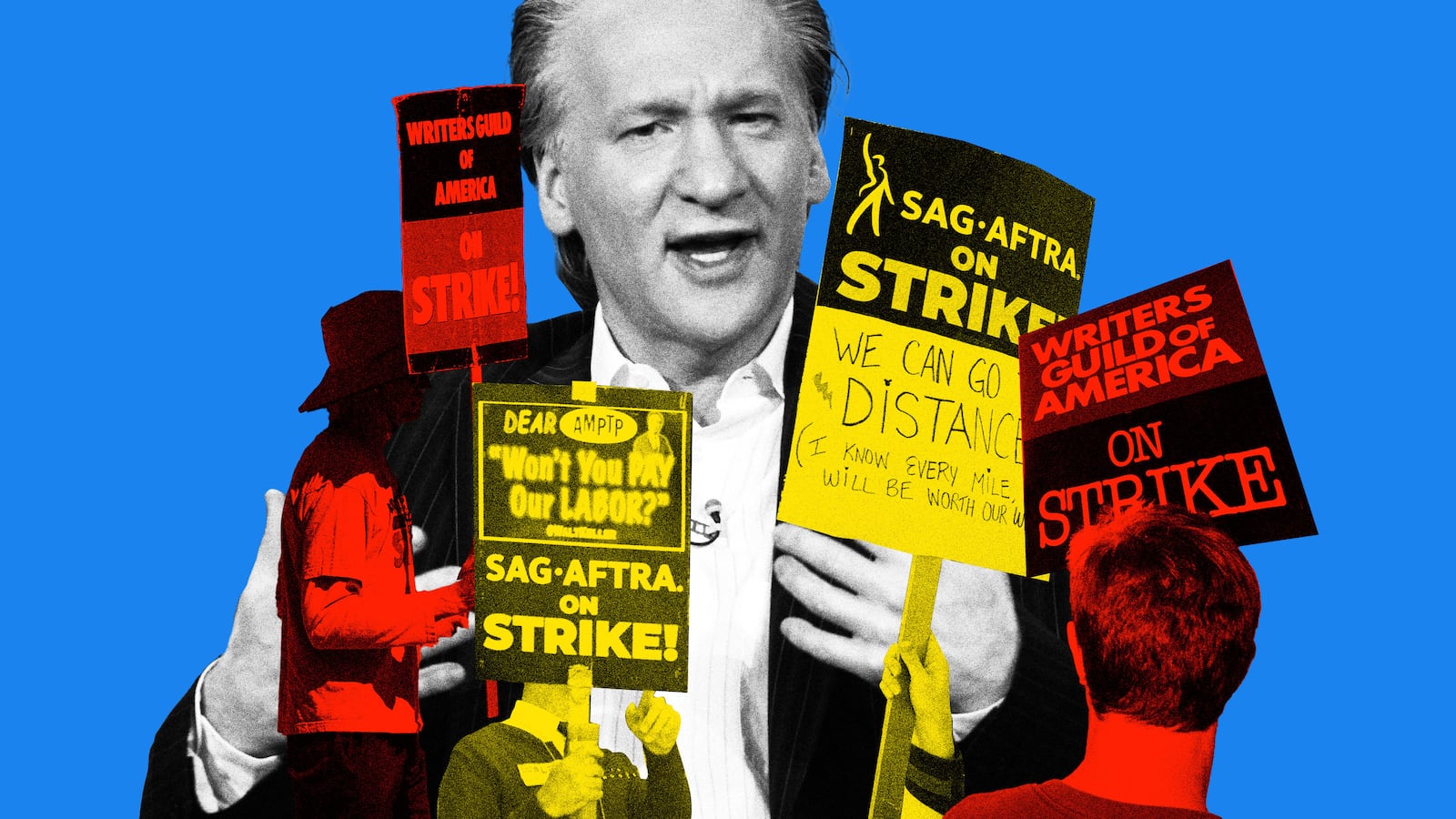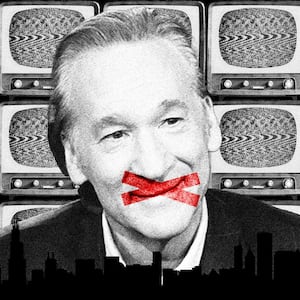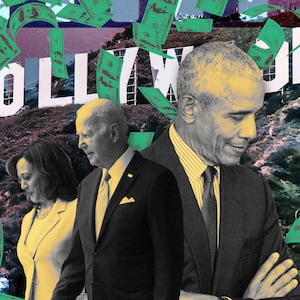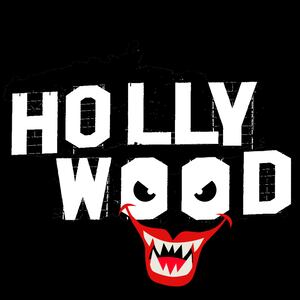On the latest episode of Bill Maher’s podcast, Club Random, he interviewed comedian Jim Gaffigan. At one point, Maher brought up the strike by first the Writers Guild of America (WGA) and now also the Screen Actors Guild-American Federation of Television and Radio Artists (SAG-AFTRA) that’s shut down Hollywood. He portrayed the striking workers as fundamentally unreasonable.
“These guys would never go back,” he said—presumably meaning they won’t go back until the studios make concessions. “This strike could go on until the 24th century. They would stay out.”
After saying he “feels for” and “loves” the writers for his HBO show, Real Time with Bill Maher, he insisted that “there’s a big other side to it”—because a prolonged strike hurts lots of people besides the strikers. He mocked the idea that “they’re fucking Che Guevara out there... like this is Cesar Chavez’s lettuce-picking strike” and insisted “it’s much more complicated than that.”
Gaffigan pushed back, pointing out that the writers have legitimate grievances. Bill conceded that “they’re being screwed a bit by the streamers,” but still characterized many of the writers’ demands as “kooky,” adding that what he finds “objectionable about the philosophy of the strike” is that “they kind of believe that you’re owed a living as a writer and you’re not.”
Really?
The Hollywood studios and streaming services are obscenely profitable. Granting the writers’ “kooky” demands would cost the tiniest fraction of those profits. We’re talking about the people who write every sentence spoken by every character in every movie and on every show.
They even write the material Bill Maher clumsily delivers every week on Real Time, often getting mad at the audience if they don’t laugh hard enough at the results. HBO pays him a salary that works out to well over a quarter of a million dollars per episode. Does he truly think the writers, without whom the entire industry would cease to exist, aren’t so much as “owed a living”?

SAG-AFTRA actors and Writers Guild of America (WGA) writers walk the picket line during their ongoing strike outside Sunset Bronson studios in Los Angeles, CA on August 11, 2023.
Mario Anzuoni/ReutersHow the Strike Actually Started—and Why
Maher blames intransigent writers for the suffering of everyone who’s taken a hit from the strike. He says that writers who think they’re “owed a living” don’t understand how things work, since “this is show business” and it’s “make-or-miss.”
These statements flagrantly misrepresent how and why the strike started in the first place.
Of course just wanting to be a writer doesn’t mean you’re owed success as a writer. The question is whether the WGA members who actually are writing the content that generates massive profits for their bosses are owed enough of that revenue to make a decent living.
Nor are writers demanding a better deal than their predecessors in previous generations got. (Personally, I’d be all for it if they were demanding that, but they’re not.) They’re trying to claw back some approximation of the old deal now that new technologies have provided the studio bosses with an excuse to adopt a business model far less friendly to writers’ interests.
In the old days, if you wrote an episode of a TV show and the episode continued to make money for your bosses for years or decades in the future, you were paid residuals that reflected that. Now, Netflix for example doesn’t even tell writers how many people are watching Netflix-original shows. A popular show can be wildly profitable for Netflix after it comes out without the writers (or actors) getting paid anything extra as a result—at least in the United States. In several European countries, they’ve already had to accede to showing writers the numbers and paying “success-based” residuals.
When the WGA pushed for something similar in the U.S., the studios didn’t even come up with a counterproposal. The day before the writers’ strike started, the union made public a list of the demands they’d pushed for in negotiations and what the studios counteroffered.
Many of the counteroffers were deliberately insulting. In response, for example, to a proposal for a guaranteed “second step” to compensate writers hired to write an initial draft of a screenplay for their time in writing a proposed second draft, the studios counteroffer was, “Countered by offering meetings to educate creative executives and producers about screenwriters’ free work concerns.” I can just imagine those meetings. “Do I have to pay them anything for this part?” “Nope.” “OK, cool.”
On many other points, including success-based residuals for streaming, the document simply reads, “Rejected our proposal. Refused to make a counter.“
That’s the behavior of bosses swimming in pools of gold coins like Scrooge McDuck, confident that they could provoke a strike and simply outlast cash-strapped writers until the union breaks.

SAG-AFTRA actors and Writers Guild of America (WGA) writers walk the picket line during their strike outside Paramount studios in Los Angeles, CA on August 2, 2023.
Mario Anzuoni/ReutersRunning the Numbers
To put this in perspective, the estimated cost of meeting all of the writers’ demands for Disney, for example, would be a bit less than 1 percent of their annual revenue of $82.7 billion. For Netflix, it would be a little over two-tenths of 1 percent of their annual revenue of $31.6 billion. For the real giants like Apple and Amazon, it “doesn’t even rise to the level of a rounding error.”
It would cost “pure content companies” a bit more than it would cost those tech giants, but even in that case we’re talking about a price tag of a bit more than one-tenth of 1 percent of Warner Bros annual profits (to cite just one such example). As a raw number, the estimated annual cost to Warner Bros would be $47 million. That would work out to $235 million over the course of the next five years.
If that sounds like a lot of money, keep in mind that Warner Bros CEO David Zaslav was paid more than $498.9 million over the course of the last five years. In fact, the strike itself is almost certainly costing the studios far more than they would be paying right now if they granted 100 percent of what the writers want. The studios are holding out because they think they can make even more in the long run—if they break the will of the workers who generated all the content that made them rich.
Bill Maher says he’s worried that the striking writers will hold out until the “24th century.” The studio bosses don’t seem to share that concern. One executive bluntly told Deadline back in July, “The endgame is to allow things to drag on until union members start losing their apartments and losing their houses.”
In his discussion with Jim Gaffigan, Maher conceded (merely in passing) it’s not great that writers don’t even get to see the numbers for the shows they write, never mind get compensated for their success in a way remotely comparable to what was standard in the past. But, Maher added, he deplored the rancorous political atmosphere of 2023—where everyone has to either be on one “side” or another. The reality is that workers fighting for justice have always demanded that onlookers get off the fence.
A classic miners’ song from the 1930s boils it down to a simply question:
Don’t scab for the bosses
Don’t listen to their lies
Poor folks ain’t got a chance
Unless they organize
Which side are you on, boys?
Which side are you on?
I guess we have Maher’s answer. The self-described “liberal” isn’t with the workers, he’s with the bosses.









